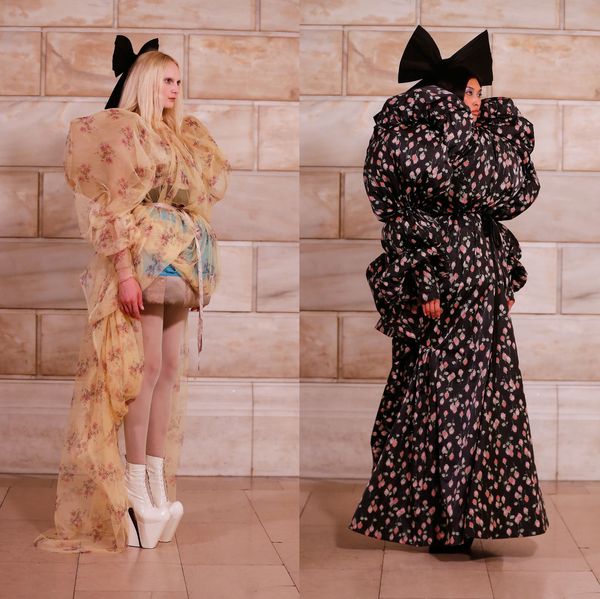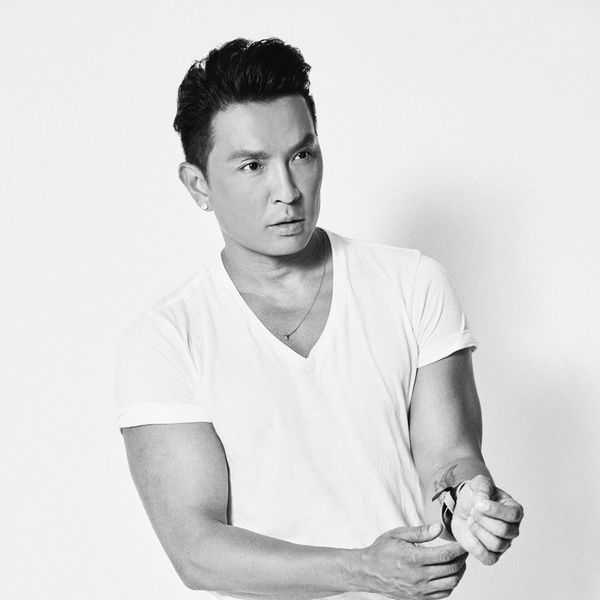Beauty
Geenie Is the “Black Girl Magic” Beauty Marketplace of Your Dreams
Move over, Sephora—founder Chana Ewing is here to shower the beauty space with color.
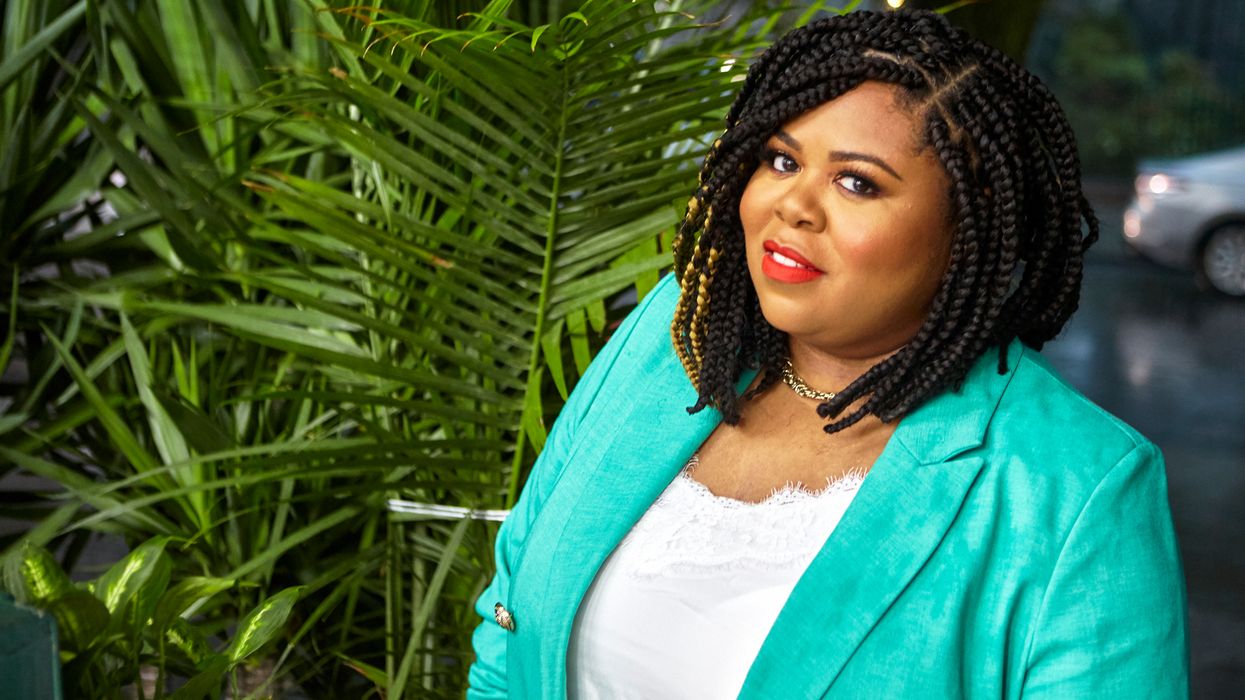
27 July, 2020
10 November, 2021
Chana Ewing doesn’t mess around. The founder of digital beauty marketplace Geenie, which launches today, has done her research, knows exactly what she’s here to accomplish, and has the receipts to prove it.
And if we know what’s good for us, soon we’ll all have the receipts too—receipts from our purchases from Geenie, which exclusively features Black, Indigenous, and People of Color–owned, culture-first, indie beauty brands.
The first beauty site we know of that is “rooted in intersectionality,” Geenie is kicking things off with lipsticks from Beaute Brownie, Kami Cosmetics, Gold Label Cosmetics, Hi Wildflower, and Fempower Beauty, all chosen for, as Ewing puts it, “their intersectional beauty lens and commitment to moving culture forward in their own unique ways.”
Though you’ll only find lipstick on the site today, that is just a starting point. “We decided to focus on lipsticks before adding other product categories because of the fun nature of the product and the wide range of colors and finishes available,” Ewing says. Plus, everyone knows that lipstick is the only makeup truly worth wearing for a Zoom meeting.
Ewing plans to expand to add other categories “with the feedback and input from our community,” she says. “We’ll let the community lead how we’ll grow.”
Ahead, find out more about the importance of supporting BIPOC-owned brands, intersectionality in the beauty world, and what it’s like to open a beauty company in the middle of a pandemic.
And if we know what’s good for us, soon we’ll all have the receipts too—receipts from our purchases from Geenie, which exclusively features Black, Indigenous, and People of Color–owned, culture-first, indie beauty brands.
The first beauty site we know of that is “rooted in intersectionality,” Geenie is kicking things off with lipsticks from Beaute Brownie, Kami Cosmetics, Gold Label Cosmetics, Hi Wildflower, and Fempower Beauty, all chosen for, as Ewing puts it, “their intersectional beauty lens and commitment to moving culture forward in their own unique ways.”
Though you’ll only find lipstick on the site today, that is just a starting point. “We decided to focus on lipsticks before adding other product categories because of the fun nature of the product and the wide range of colors and finishes available,” Ewing says. Plus, everyone knows that lipstick is the only makeup truly worth wearing for a Zoom meeting.
Ewing plans to expand to add other categories “with the feedback and input from our community,” she says. “We’ll let the community lead how we’ll grow.”
Ahead, find out more about the importance of supporting BIPOC-owned brands, intersectionality in the beauty world, and what it’s like to open a beauty company in the middle of a pandemic.
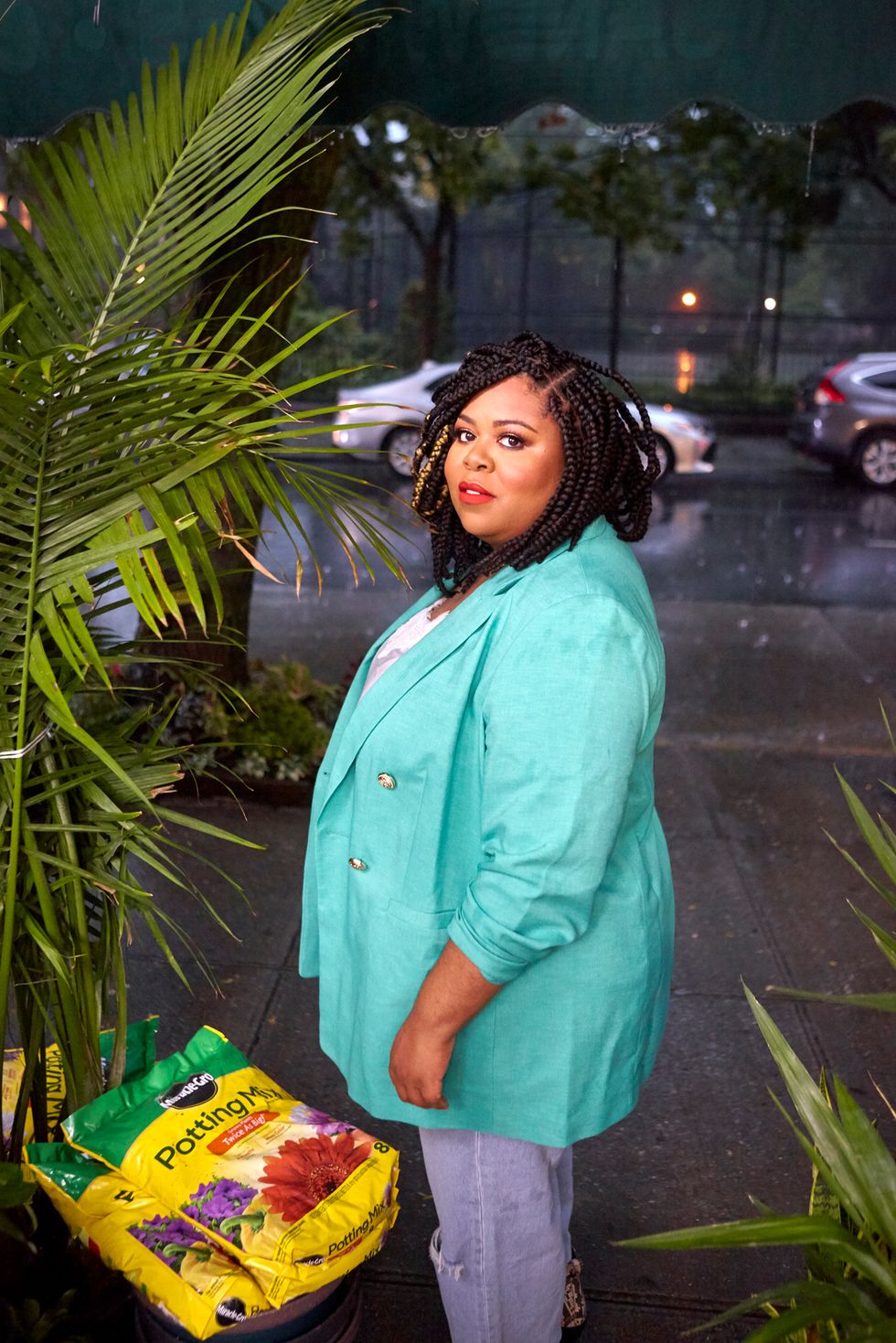 Photo: Luis Garcia
Photo: Luis GarciaTell me more about the word Geenie—where did it come from? How did you know that was the name for your business?
“It originated from this idea of finding an easy way to reference ‘Black Girl Magic’ and also our genius. I wanted to constantly be reminded and inspired by the magic and genius of Black women.”
What has it been like to launch a beauty marketplace during a pandemic?
“Launching a brand during a pandemic has been difficult, but as a Black, queer woman, there was never going to be an ‘easy’ time to start. There are some real systemic challenges that exist all the time for Black women, even though we’re excelling and outshining other groups on so many fronts.
“We’re starting businesses faster than any other group; we’re the only racial or ethnic group with more business ownership than male peers—yet fewer than 60 Black women have raised $1M for their business. That’s a real problem.
“Add to that the stress of launching a business during a pandemic, an ensuing recession, and a national moment of reckoning on race, and it’s a lot for entrepreneurs, broadly, to navigate in this moment. Still, I’m excited by the incredible market opportunity in beauty and our incredible team and advisors.”
I love the image of a woman wearing colorful makeup that greets you on the Geenie site right now. How did you choose her to represent your brand, and how did you figure out the logistics of a photo shoot during a pandemic?
“That’s Tiffany Harrison! She’s a freelance photographer, writer, and art director and has been a member of our creative team building the brand. I thought she, and that image, were a great representation of what Geenie is: bold, fun, and creative. We say that Geenie is building a world that is more ‘us’—what we mean by that is that we’re rewriting the narrative around beauty. It’s important that the Black and brown women who join our community feel not only represented, but centered.
“Shooting in a pandemic has been interesting, to say the least. There are a million moving parts when you’re launching a brand, and not being physically present for some things definitely adds to the challenge. But there’s a lot that we’re able to do virtually—we produced our launch campaign video using Zoom, an editor in Singapore (sourced via Upwork), and an incredible digital artist based in South Africa (Sinenhlanhla Chauke) discovered on Instagram. I found our models amongst my friends, including a professional model, Chandler Estelle.”
“It originated from this idea of finding an easy way to reference ‘Black Girl Magic’ and also our genius. I wanted to constantly be reminded and inspired by the magic and genius of Black women.”
What has it been like to launch a beauty marketplace during a pandemic?
“Launching a brand during a pandemic has been difficult, but as a Black, queer woman, there was never going to be an ‘easy’ time to start. There are some real systemic challenges that exist all the time for Black women, even though we’re excelling and outshining other groups on so many fronts.
“We’re starting businesses faster than any other group; we’re the only racial or ethnic group with more business ownership than male peers—yet fewer than 60 Black women have raised $1M for their business. That’s a real problem.
“Add to that the stress of launching a business during a pandemic, an ensuing recession, and a national moment of reckoning on race, and it’s a lot for entrepreneurs, broadly, to navigate in this moment. Still, I’m excited by the incredible market opportunity in beauty and our incredible team and advisors.”
I love the image of a woman wearing colorful makeup that greets you on the Geenie site right now. How did you choose her to represent your brand, and how did you figure out the logistics of a photo shoot during a pandemic?
“That’s Tiffany Harrison! She’s a freelance photographer, writer, and art director and has been a member of our creative team building the brand. I thought she, and that image, were a great representation of what Geenie is: bold, fun, and creative. We say that Geenie is building a world that is more ‘us’—what we mean by that is that we’re rewriting the narrative around beauty. It’s important that the Black and brown women who join our community feel not only represented, but centered.
“Shooting in a pandemic has been interesting, to say the least. There are a million moving parts when you’re launching a brand, and not being physically present for some things definitely adds to the challenge. But there’s a lot that we’re able to do virtually—we produced our launch campaign video using Zoom, an editor in Singapore (sourced via Upwork), and an incredible digital artist based in South Africa (Sinenhlanhla Chauke) discovered on Instagram. I found our models amongst my friends, including a professional model, Chandler Estelle.”
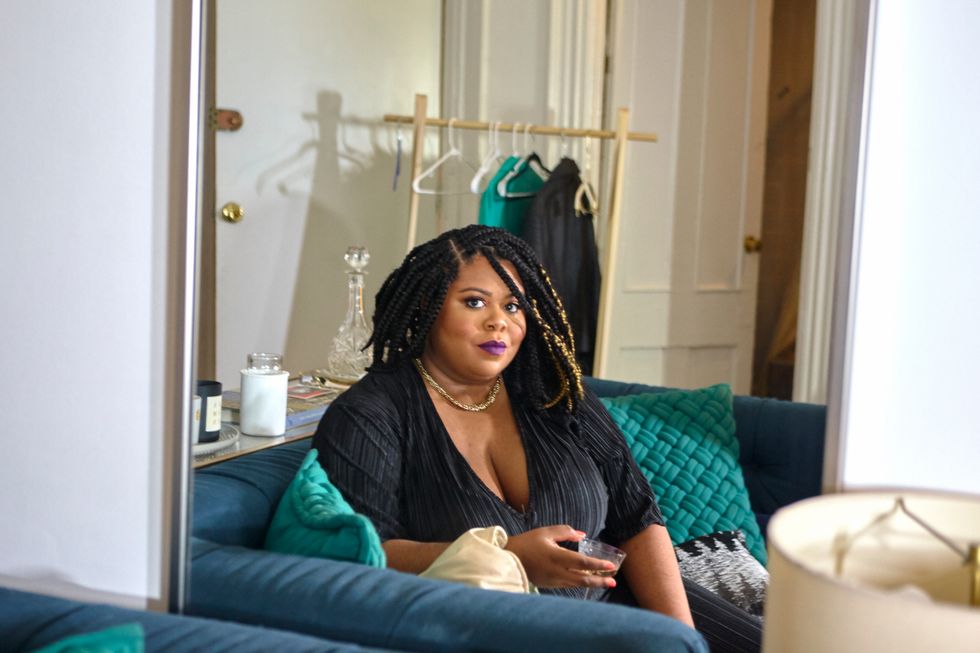 Photo: Luis Garcia
Photo: Luis GarciaHow will you choose which brands deserve to be featured in your space? How did you choose the brands that will be featured as of the launch?
“Geenie’s mission is to center brands that are ‘culture-first,’ [meaning] brands that are representative of a multitude of identities and experiences. On the platform, we have brands that are BIPOC-owned, queer-founded, sustainably sourced, environmentally conscious, and committed to shade inclusivity and fighting colorism.
“We’re also a platform for discovery, so we want to champion indie brands. There are so many culture-first beauty brands out there that are absolutely killing it, but not getting the recognition they deserve. We want to serve these brands just as much as we serve our shoppers, helping them expand their audiences and tap into a community who want to shop with intention.
“One of my primary motivations is to move money into the pockets of more Black and brown folx, so brands that support that mission are the brands we want to feature.”
Even a year ago, announcing that you were launching a beauty marketplace “rooted in intersectionality” would have resulted in a lot of glazed eyes. But people are waking up and learning about things like intersectionality and why it’s important to support the sellers you’ll be including—namely, as you say, Black, Indigenous, and People of Color–owned and culture-first indie beauty brands. Can you talk a little bit about this and what this means to you?
“I consider myself a cultural entrepreneur. I’m obsessed with building an intersectional world, and it’s really important to me that all of my work centers around multicultural audiences and tells the stories of intersectional audiences.
“You’re completely right that the idea of intersectional beauty would sound foreign to a lot of people a year ago. But I think the shift in the past year, and past few months even, has been huge. The age of consumer activism has accelerated.
“The year 2020 has undeniably laid bare the disparity between white and Black America, and white and non-Black POC folx are waking up to the understanding that allyship requires continuous action. Black people have been working at this for years, and now more non-Black folx are showing support for Black Lives Matter, for instance. We see people self-organizing lists of Black-owned businesses, deciding to move their purchases off Amazon and funnel their money into brands that are more aligned with their values.
“People are fed up with the injustices they are seeing and really starting to understand that one way they can make a difference is by thinking very carefully about how, where, and with whom they spend their money.”
When did you start planning to launch Geenie? In some ways it seems like a fortuitous time to launch a company like this; in other ways, it seems like a hard time to launch a business. Which way does it feel to you?
“Before Geenie, I self-funded a subscription-box company centering Black women called GeenieBox. In developing GeenieBox, I saw the opportunity to not just provide products and uplift brands that were BIPOC-founded, but to create an entire community around this idea of value-based purchasing.
“Last December we announced our intention to move from the subscription model. While I had my vision for what I wanted Geenie to be, I couldn’t have anticipated the world we all find ourselves in today. From a global pandemic to an uprising and national reckoning on race, we’re all moving through great change at warp speed.
“But despite the chaos, this moment has allowed great clarity. I’ve thought about how I can and will grow both in and through this moment, and what opportunities that opens for Geenie specifically. I believe the opportunity is in values, and that has been a North Star that has enabled me to push through and rise to the occasion of these challenging times and help answer important questions: ‘What do I value? Who do I value? And how do I live my beliefs out loud?’
“So, yes, it’s scary to launch a business, especially in such a pivotal cultural moment, but more than anything, I’m excited to finally get to share Geenie with the world and help other people answer these same questions.”
“Geenie’s mission is to center brands that are ‘culture-first,’ [meaning] brands that are representative of a multitude of identities and experiences. On the platform, we have brands that are BIPOC-owned, queer-founded, sustainably sourced, environmentally conscious, and committed to shade inclusivity and fighting colorism.
“We’re also a platform for discovery, so we want to champion indie brands. There are so many culture-first beauty brands out there that are absolutely killing it, but not getting the recognition they deserve. We want to serve these brands just as much as we serve our shoppers, helping them expand their audiences and tap into a community who want to shop with intention.
“One of my primary motivations is to move money into the pockets of more Black and brown folx, so brands that support that mission are the brands we want to feature.”
Even a year ago, announcing that you were launching a beauty marketplace “rooted in intersectionality” would have resulted in a lot of glazed eyes. But people are waking up and learning about things like intersectionality and why it’s important to support the sellers you’ll be including—namely, as you say, Black, Indigenous, and People of Color–owned and culture-first indie beauty brands. Can you talk a little bit about this and what this means to you?
“I consider myself a cultural entrepreneur. I’m obsessed with building an intersectional world, and it’s really important to me that all of my work centers around multicultural audiences and tells the stories of intersectional audiences.
“You’re completely right that the idea of intersectional beauty would sound foreign to a lot of people a year ago. But I think the shift in the past year, and past few months even, has been huge. The age of consumer activism has accelerated.
“The year 2020 has undeniably laid bare the disparity between white and Black America, and white and non-Black POC folx are waking up to the understanding that allyship requires continuous action. Black people have been working at this for years, and now more non-Black folx are showing support for Black Lives Matter, for instance. We see people self-organizing lists of Black-owned businesses, deciding to move their purchases off Amazon and funnel their money into brands that are more aligned with their values.
“People are fed up with the injustices they are seeing and really starting to understand that one way they can make a difference is by thinking very carefully about how, where, and with whom they spend their money.”
When did you start planning to launch Geenie? In some ways it seems like a fortuitous time to launch a company like this; in other ways, it seems like a hard time to launch a business. Which way does it feel to you?
“Before Geenie, I self-funded a subscription-box company centering Black women called GeenieBox. In developing GeenieBox, I saw the opportunity to not just provide products and uplift brands that were BIPOC-founded, but to create an entire community around this idea of value-based purchasing.
“Last December we announced our intention to move from the subscription model. While I had my vision for what I wanted Geenie to be, I couldn’t have anticipated the world we all find ourselves in today. From a global pandemic to an uprising and national reckoning on race, we’re all moving through great change at warp speed.
“But despite the chaos, this moment has allowed great clarity. I’ve thought about how I can and will grow both in and through this moment, and what opportunities that opens for Geenie specifically. I believe the opportunity is in values, and that has been a North Star that has enabled me to push through and rise to the occasion of these challenging times and help answer important questions: ‘What do I value? Who do I value? And how do I live my beliefs out loud?’
“So, yes, it’s scary to launch a business, especially in such a pivotal cultural moment, but more than anything, I’m excited to finally get to share Geenie with the world and help other people answer these same questions.”
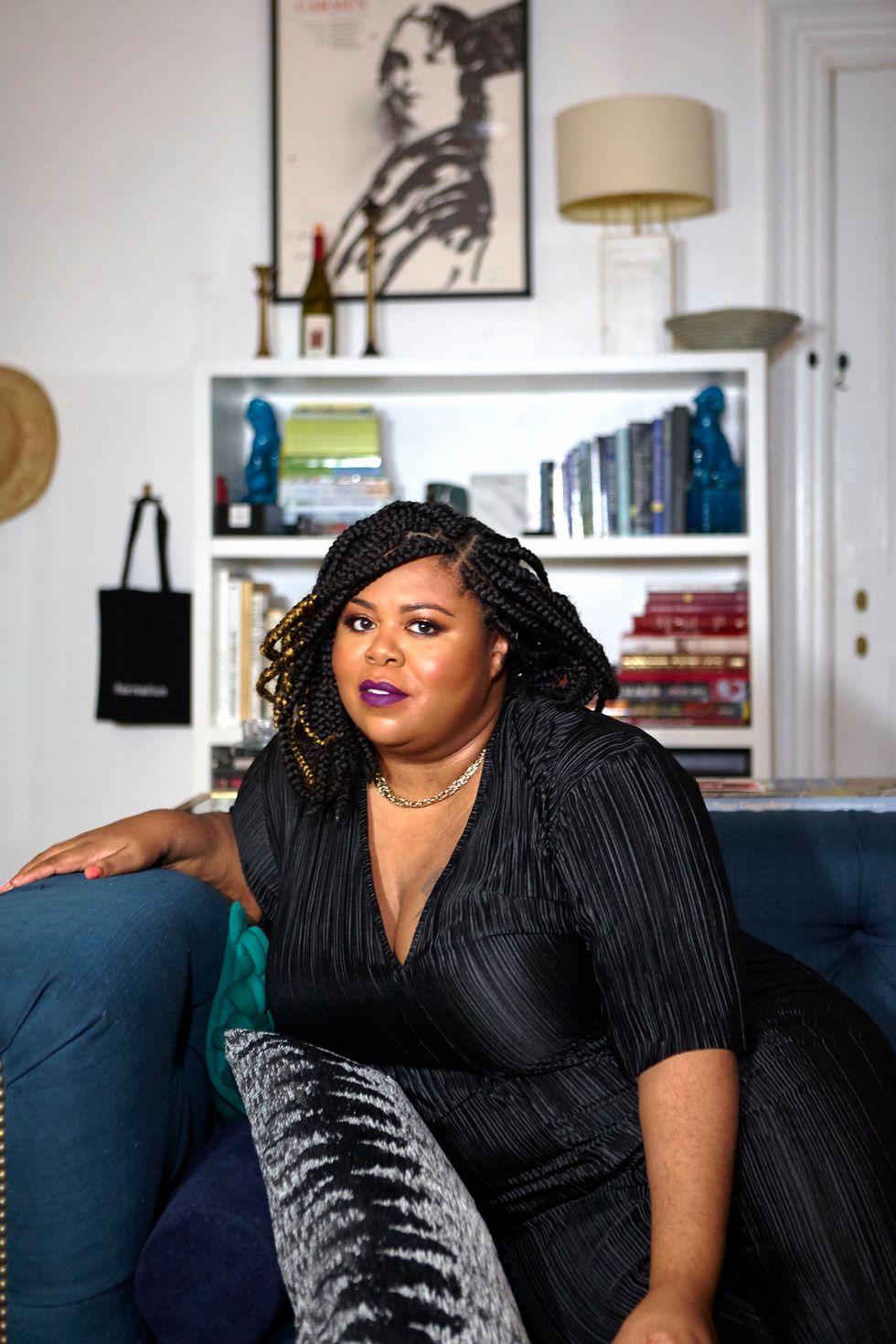 Photo: Luis Garcia
Photo: Luis GarciaAs soon as I heard about your platform, I thought of t.a., which is already earning comparisons to Opening Ceremony and Totokaelo (RIP) and was also launched during the pandemic. I think it’s exciting that, as huge conglomerates close, new, fresh, exciting Black, Indigenous, and People of Color–owned companies are rushing in to fill the void—and make that space way better. Thoughts?
“It’s exciting to see the shift in narrative and in power happening in real time. I think we’ve seen—in the past few months especially—all the ways that huge conglomerates have created really untenable atmospheres for BIPOC consumers and employees, and perpetuated systemic racism through their practices.
“People are sick of the ‘woke washing’ and are able to see right through it. Again, I’m focused on intersectionality because it demands that marketers take time to understand the subtleties, richness, and nuances of traditionally underserved audiences, both identities and value systems, and puts pressure on businesses to provide products, services, and opportunities that align.
“This shift won’t, and can’t, be led by white people, so I’m thrilled to see more Black founders forging the path forward through their leadership.”
I see that Geenie won’t just be a marketplace—it’s a community. You’ll feature things like AMAs with brands, educational resources on anti-racism, ethical shopping, and more. What AMAs do you have on deck? What kinds of educational resources on anti-racism will you share? And what kinds of ethical shopping resources do you plan to feature?
“The community aspect is hugely important to Geenie. We want to create a safe space for folx to commune with other conscientious beauty enthusiasts, with the goal of learning and growing on their intentional shopping journey. Shopping for your values is a lifelong practice—it’s an expression of who you are, not a one-time thing you do. So we want to create a powerful community where people can continuously find new sources of support and inspiration.
“We already have some exciting AMAs lined up, including our first one with Angela Purcaro, US head of digital and PR at Benefit Cosmetics, on growing a social media presence for your indie beauty brand. Benefit Cosmetics is also a promotional partner on our launch day [July 27]. Check out our Instagram takeover.
“We also have a dedicated channel in our community-focused on action. Each month or so, we’re spotlighting a different action for our community to support and activate around. We’re starting with ‘buy Black-owned.’
“We want to encourage our members to become active in many ways, so we’re sharing many different types of resources: articles to read and discuss; social media posts to share on their networks; books, movies, and podcasts to incorporate into their daily lives; brands to move their money to, etc. These resources will be curated by the Geenie team but also shared by the community. We’re building a world together, so the input from our members is just as important an element.”
Photos: Luis Garcia
Want more stories like this?
5 Black-Owned Hair Brands You Need to Know
33 Black- and Brown-Owned Beauty Brands to Support
7 Black-Owned Brand Founders on How the Beauty Industry Needs to Change
“It’s exciting to see the shift in narrative and in power happening in real time. I think we’ve seen—in the past few months especially—all the ways that huge conglomerates have created really untenable atmospheres for BIPOC consumers and employees, and perpetuated systemic racism through their practices.
“People are sick of the ‘woke washing’ and are able to see right through it. Again, I’m focused on intersectionality because it demands that marketers take time to understand the subtleties, richness, and nuances of traditionally underserved audiences, both identities and value systems, and puts pressure on businesses to provide products, services, and opportunities that align.
“This shift won’t, and can’t, be led by white people, so I’m thrilled to see more Black founders forging the path forward through their leadership.”
I see that Geenie won’t just be a marketplace—it’s a community. You’ll feature things like AMAs with brands, educational resources on anti-racism, ethical shopping, and more. What AMAs do you have on deck? What kinds of educational resources on anti-racism will you share? And what kinds of ethical shopping resources do you plan to feature?
“The community aspect is hugely important to Geenie. We want to create a safe space for folx to commune with other conscientious beauty enthusiasts, with the goal of learning and growing on their intentional shopping journey. Shopping for your values is a lifelong practice—it’s an expression of who you are, not a one-time thing you do. So we want to create a powerful community where people can continuously find new sources of support and inspiration.
“We already have some exciting AMAs lined up, including our first one with Angela Purcaro, US head of digital and PR at Benefit Cosmetics, on growing a social media presence for your indie beauty brand. Benefit Cosmetics is also a promotional partner on our launch day [July 27]. Check out our Instagram takeover.
“We also have a dedicated channel in our community-focused on action. Each month or so, we’re spotlighting a different action for our community to support and activate around. We’re starting with ‘buy Black-owned.’
“We want to encourage our members to become active in many ways, so we’re sharing many different types of resources: articles to read and discuss; social media posts to share on their networks; books, movies, and podcasts to incorporate into their daily lives; brands to move their money to, etc. These resources will be curated by the Geenie team but also shared by the community. We’re building a world together, so the input from our members is just as important an element.”
Photos: Luis Garcia
Want more stories like this?
5 Black-Owned Hair Brands You Need to Know
33 Black- and Brown-Owned Beauty Brands to Support
7 Black-Owned Brand Founders on How the Beauty Industry Needs to Change


